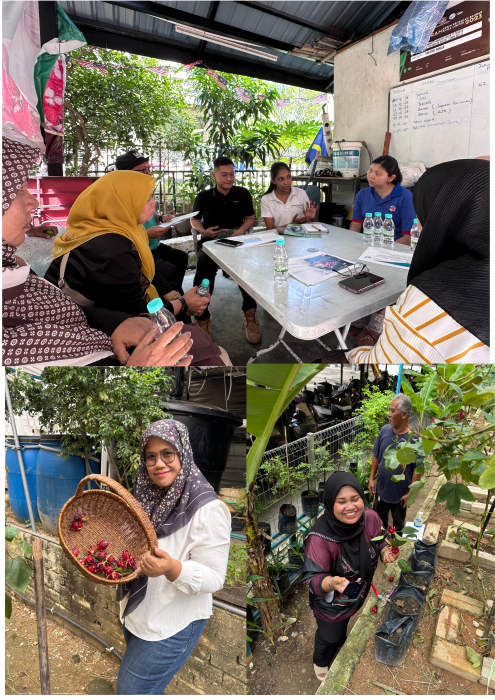Hong Leong Bank Partners with Think City and GreenSteps to Drive Circular Economy Solutions for Sustainable Cities
Hong Leong Bank Partners with Think City and GreenSteps to Drive Circular Economy Solutions for Sustainable Cities
Starting with a composting and waste management program at PPR Taman Mulia, this joint initiative pioneers community-driven programs that generate environmental, economic, and social benefits for urban neighbourhoods.

KUALA LUMPUR, 14 NOVEMBER 2025 – Hong Leong Bank (“HLB” or “the Bank) has announced the launch of EcoKita, a new program focused on accelerating the transition to a low-carbon economy and improving community waste management practices. This initiative is a collaborative effort with Think City, an impact organization specializing in urban regeneration, and GreenSteps, a company focusing on innovative urban re-design strategies that drive communities and corporations toward a low-carbon circular economy. EcoKita aims to foster sustainable practices and significantly reduce urban greenhouse gas emissions in Malaysia by implementing community-led waste treatment solutions and promoting waste separation, particularly within public housing areas.
As the initial phase of this initiative, the Bank launched its pilot site at PPR Taman Mulia. This tightly-knit complex houses over 4,000 residents, and is strategically situated near the LRT Bandar Tun Razak station and a vibrant commercial area. The residents there have already demonstrated environmental responsibility and income generation by resourcefully converting underutilized spaces into a successful community garden.
Following hands-on compost and garden management training at the PPR Taman Mulia Community Farm, participating residents successfully diverted 392 kilograms of organic waste from landfills in just three months. This composting effort resulted in a significant environmental benefit, saving 745 kgCO2e in carbon dioxide emissions that would have otherwise been generated by the waste in landfills. Furthermore, the process yielded 150 kilograms of nutrient-rich compost, which is now being sold and used in the community garden.
Chow Sheng Wai, HLB’s Chief Sustainability Officer, commented, “At HLB, we believe sustainability must be inclusive and community driven, aligned with our brand value of being Here for the Long Term. The EcoKita program demonstrates our commitment to forging strategic partnerships that make a lasting impact, both with Think City and GreenSteps, and also with the communities we serve. It is a testament to how communities can transform organic waste into value that benefits society and the environment, reflecting our continued dedication to building resilient communities and advancing sustainable growth, while supporting Malaysia’s transition towards a low-carbon, circular economy.”
Dr. Shahridan Faiez, Director of the Program Kita-untuk-Kita (“K2K”) by Think City, emphasized the broader impact of the initiative. “Think City has long championed community-driven placemaking and sustainability initiatives, and EcoKita is a good example of how community-driven initiatives, supported by strong partnerships, can deliver measurable outcomes that drive systemic change. Together, we are building a culture of shared responsibility for a healthier city while creating new pathways for social and economic transformation. The Taman Mulia community, through K2K’s Forum Komuniti (“FORKOM”) program, has shown how sustainable practices can be woven into daily life, setting an example for other communities to drive meaningful change.”
According to the Solid Waste Management and Public Cleansing Corporation (“SWCorp”), Malaysians waste up to 17,000 tonnes of food every day. This contributes to rising greenhouse gas emissions and waste management costs, all while preventing carbon and essential nutrients from being cycled back into the soil.
Fiona Zuzartee, Founder & CEO of GreenSteps, who serves as the technical partner for the design and implementation of the initiative, emphasised the importance of taking a strategic approach to the waste crisis in the country.
“EcoKita is a component initiative under our Low-Carbon Circular Economy Blueprint, and is designed to be a replicable model for cities to redesign the flow of waste through a structured pathway, shifting organic waste away from landfills and into productive cycles. Our vision is to replicate this model across Malaysia and the region to reduce our collective environmental impact, increase food security, regenerate urban environments and create resilient communities in the face of climate change.”
Speaking on the initiative’s impact, Rasul bin Md Sani, Taman Mulia’s Community Leader, said, “Before this initiative, food waste in our community went unmanaged and was often dumped irresponsibly, posing environmental and health concerns. With the knowledge and tools provided, we now collect organic waste at source, compost it efficiently, and have begun selling our own compost alongside produce from our community garden.”
